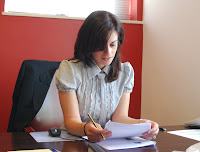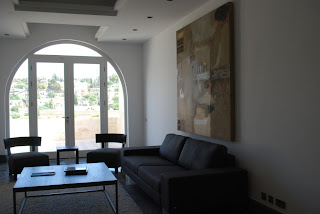I've been meeting with various capital providers in Jordan and also speaking with some in other parts of the region. My primary role with Endeavor is to discover, profile and establish relationships with these capital providers. The hope is that they volunteer their time as VentureCorps Mentors for our Endeavor Entrepreneurs and that they can potentially be providers of capital to the entrepreneurs who need it. In exchange they get unfettered access to entrepreneurs who have been through a rigorous 5-stage selection process and could be great investment opportunities, as well as access to the Endeavor network and events.
By now I think I know every venture capital firm in Jordan. I've met with most of them and will be meeting with the rest this week or next. I've also met with several funds outside of Jordan and know of most of the rest. As such, I can say from experience, the venture industry in the region is nascent at best.
First, many "funds" aren't actually funds. That is, they actually don't have any money. People typically start venture advisory practices, providing fee-for-consulting services to entrepreneurs, in order to earn a living while they try to raise capital. Oftentimes investors aren't used venture terms and time horizons. They don't want to tie up their capital in a fund. Or they don't have the appetite for venture risk. Thus, often these firms are unable to raise capital so they continue operating as an advisory business. If an investment opportunity arises, they pool their network to see if they can find investors.
Second, even the firms who actually have capital and are structured as a venture fund typically find that it is extremely difficult to operate as a venture capitalist. Now the problem has to do with the entrepreneurs themselves. Entrepreneurs in the region simply lack an understanding of venture capital terms. They are unable to grasp concepts like right of first refusal, drag along provisions, preferred stock, participating features, veto rights, etc. Further, their "advisors" don't seem to be properly preparing them for these types of discussions; perhaps because the advisors themselves aren't fully versed in this language.
Third, there are some Islamic funds which follow shari'a law. Essentially, all this means is that the companies in which they invest cannot engage in certain unallowable activities that involve: gambling, alcohol, and charging or paying interest. It also means the fund itself can't structure securities that have debt characteristics. The existence of such funds is good since they provide an alternative for entrepreneurs who prefer to seek Shari'a compliant funding. However, for other entrepreneurs, they can mean a longer vetting process with unecessary restrictions. Additionally, venture capitalists often incorporate debt-like characteristics in their securities as a way of lessening the downside risk. So, to the extent Islamic funds cannot afford themselves this flexibility, they might involve themselves in a riskier type of investing than other venture funds.
This leads me to believe that while initiatives such as the Queen Rania Center for Entrepreneurship (QRCE) are quite admirable, there is still a long way to go. Largely, government initiatives are encouraging very early stage entrepreneurship. They are teaching Jordan's educated how to venture out on their own and build a real business. For example, I attended a very well-run and well attended QRCE seminar yesterday on Blue Ocean Strategy. The presenter was knowledgable, the audience engaged. Interestingly, I estimate the audience was 30%-40% women, and the women were much more vocal and interactive than the men. While these early stage initiatives are necessary, they are not sufficient. Further effort is needed to help entrepreneurs move beyond the early stage and build an environment where they have access to customers, partners and investors.
There is a role for an organization like Endeavor, which is focused on more established entrepreneurs who can employ many people and serve as role models for other aspiring entrepreneurs. Endeavor's high profile local board and VentureCorp gives it clout in the region. It can engage with the few true venture funds, verse its entrepreneurs in venture language and educate them on the benefits of VC. It can then hold up these transactions as successful examples for others to follow - both budding entrepreneurs and budding investors.
Additionally, more needs to be done on the policy side: to encourage venture investing, to headquarter more established businesses to the region as a way of creating an entrenched base of potential partners and acquirers for younger companies, and to ease registration and tax filing requirements for existing businesses.
Already, Jordanians who have built themselves a career in the West are returning to Jordan to give back to society. Ennis Rimawi of Catalyst PE returned a few years ago from Boston and Mohammed Alzubi of Middle East Venture Partners just returned from Silicon Valley. He informs me all of his belongings are in a crate somewhere in the middle of the ocean (not quite sure which ocean). People return full of hope and excitement, often to be disappointed by the challenges of reality on the ground. However, with a bit of friendly government policy, initiatives like the QRCE and the El-Hassan Science City, and organizations like Endeavor trying to guide constituents in the right direction, the Ennises and Mohammeds of Jordan might find some success here after all.
 Rainbow street provides a small glimps into reform efforts in Amman. Located in Jabal Amman (Mount Amman) off of the first circle, this is one of the oldest streets in the city. A few years ago the city decided to revitalize the street, creating a hip hangout destination catering to people of all ages while preserving the traditional style. Several outlooks offer beautiful views of old Amman. Cafe Jarra has a photo gallery showcasing the Country's history and monarchy. Art galleries, cafes and bookshops abound. Here is a quick picture tour of the area:
Rainbow street provides a small glimps into reform efforts in Amman. Located in Jabal Amman (Mount Amman) off of the first circle, this is one of the oldest streets in the city. A few years ago the city decided to revitalize the street, creating a hip hangout destination catering to people of all ages while preserving the traditional style. Several outlooks offer beautiful views of old Amman. Cafe Jarra has a photo gallery showcasing the Country's history and monarchy. Art galleries, cafes and bookshops abound. Here is a quick picture tour of the area:

 Books@ wall art:
Books@ wall art:





























 Thursday Night - Sky Bar. Rooftop club, outdoor air-conditioning, reservation only, $25 Belvedere Vodka drinks, beautiful Beirut skyline.
Thursday Night - Sky Bar. Rooftop club, outdoor air-conditioning, reservation only, $25 Belvedere Vodka drinks, beautiful Beirut skyline.

















